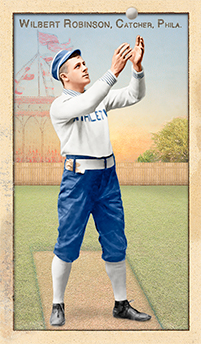- Series: Beginnings: 1880's
- City: Philadelphia
- Team: Athletics (AA)
- League: American Association
- Hall: National Baseball Hall of Fame
Uncle Robbie (1863-1934). A durable catcher for 17 seasons with 3 teams, Robinson is credited as the 1st to play directly behind the plate at all times. Uncle Robbie once caught 5 games in two days. He also had 7 hits & 11 RBI in a single game. After his playing days were over, Robinson went on to manage for 18 seasons.
- Won 3 NL pennants as player
- Won 2 NL pennants as manager
- Won 5 NL pennants as pitching coach
- Elected to Hall of Fame: 1945
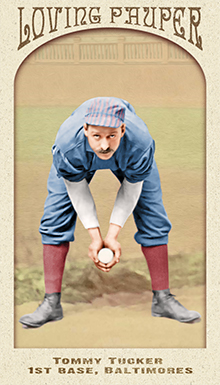
- Series: 1880s: Loving Paupers
- City: Baltimore
- Team: Orioles
- League: American Association
Thomas Joseph Tucker (1863-1935) played first base for six MLB teams from 1887 through the 1899 season. He learned the game in and around his native Holyoke, Massachusetts, coming up in the era when gloves were small to nonexistent. At age 20 he signed on with his local minor league club and stayed in New England until the American Association’s Baltimore Orioles gave him his shot in the big leagues. He was a regular immediately and stayed three years, during which Tommy batted .275 and .287 before finishing with a spectacular .372 in 1889. That led to a job with the Beaneaters in Boston where he proved a worthy successor to famed Dan Brouthers. In his seven full seasons in Boston, Tucker never again attained such a lofty average, but he was a consistently good solid hitter, exceeding .300 three times. In ‘97, the Senators purchased Tucker from the Beaneaters for $2,000 and he rewarded the club with a .338 average in his lone season in the Capital City. He split the ‘98 campaign between Brooklyn and St. Louis before closing out his career in the majors with the Cleveland Spiders. Despite tailing off at the plate after leaving Washington, the switch-hitting righty compiled a very fine .290 average overall.
Tucker was known as a tough & rowdy competitor, earning him colorful nicknames such as Noisy and Foghorn Tom.
- Tucker’s career-year in 1889 was remarkable for at least two reasons: He led the league that season and his .372 average still stands as the highest ever achieved by a switch-hitter
- Tommy tied a major league record on July 22, 1893 with four doubles and also had a perfect 6-for-6 game in 1897
- Tommy was hit-by-pitch more often than all but two players. Only Hughie Jennings and Craig Biggio exceeded his 272 career plunks
- After retiring from the majors, Tucker returned to New England and played for three minor league clubs through the 1902 season
- Bill James ranked Tucker as the 93rd greatest 1st baseman of all-time in 2001; Jay Jaffe's JAWS system ranks him today as the 108th best all-time (betwixt Ripper Collins and Charlie Hickman)
Auction History
Cartophilia
Old Judge Pose: 465-1
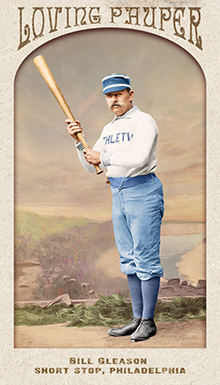
- Series: 1880s: Loving Paupers
- City: Philadelphia
- Team: Athletics (AA)
- League: American Association
William G. Gleason (1858-1932) was an American Association shortstop for three teams from 1882-89. During those eight seasons Gleason hit .267. He debuted with his hometown St. Louis Brown Stockings and participated in their three pennants in '85, '86 and '87. He was an everyday player and increased the number of games played every year with the club, culminating in '87 when he appeared in 135 games with a fine .288 average. St. Louis management must have anticipated a decline was in store. He was traded to Philadelphia's Athletics in '88, where his hitting fell off to .224. Philly dealt him to the Louisville Colonels for his final campaign. Gleason saw action in only 16 games in 1889. He stayed in pro ball for two more minor league seasons with Washington of the Atlantic Association in 1890 and finished up with the Rockford Hustlers of the Illinois-Iowa League the following year where he recorded by far the highest average on a squad that included eight other past or future big leaguers.
- In a storied and rowdy “championship” contest following the 1885 season, Gleason's Browns vied with the formidable White Stockings. Bill was at the center of the storm as his throw to first was ruled late, infuriating the home folks and precipitating a long row in which Cap Anson refused to allow the Chicago umpire to be replaced. Comiskey called his team off the field which led to a forfeit of the first game. The “Series” ended in a tie.
Auction History
Cartophilia
Old Judge Pose: 193-2
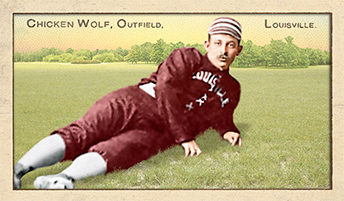
- Series: Beginnings: 1880's
- City: Louisville
- Team: Colonels
- League: American Association
William Van Winkle “Jimmy” Wolf (1862-1903) played virtually his entire career with Louisville, starting in 1882 when the club was known as the Eclipse and continuing with the Colonels through the 1891 season. He played three games for the Browns in ‘92 before heading, for the first time, to the minors for three campaigns. Known mostly as Jimmy, Wolf had the Chicken moniker hung on him by teammate Pete Browning after Wolf gorged on a pre-game boiled bird and committed several errors that day. By any name, Wolf earned a renown that has since eluded him. He was, arguably, the best hitter in the history of the American Association, and is the league's all-time leader in games played, hits, doubles, triples and total bases. The second-class status of the 19th century’s “junior circuit” has always weighed heavily in Cooperstown evaluations. Jimmy reached his pinnacle in 1890, hitting .363 and leading the post-season tourney with .360 and eight RBI. The right-hander was primarily an outfielder, but eventually saw action at every position. The previous year had immersed Wolf in the most controversy of his career. A feud with manager Dude Esterbrook led to Wolf replacing him. Jimmy faithfully carried out owner Mordecai Davidson’s tough fine schedule for on-field lapses. Things erupted into the first players’ strike and Davidson sold the club mid-summer with Wolf ending his managerial career.
- The trials and tribulations of the 1889 season swirled around Wolf and his hapless teammates en route to a spectacularly dismal record of 27-111. No surprise that tempers flared and fights broke out. Davidson’s obstinance, particularly his penchant for dunning his players, exacerbated the situation. It is to Wolf’s credit that he persevered while holding the captain’s reins and, despite the bad blood, his teammates embraced him once Davidson was gone
- Wolf was intrepid on the ball field and off. In retirement he served as a firefighter in his hometown of Louisville. His tragic death at age 41 resulted from a traumatic brain injury incurred a few years prior to 1903. Wolf was buried beside childhood friend and comrade in arms, Pete "The Louisville Slugger" Browning
- William Van Winkle Jimmy Chicken Wolf. I just had to write that again.
- Wolf enjoys five known poses in the Old Judge canon
- This card of Chicken Wolf represents the 300th and final card in the 1880s: Base Set
- It is truly gratifying to close this series on such a high and symbolic note . . . .
- with an elusive player of some magnitude whom I have been yearning and struggling to get into the series for four years now (this is my fourth attempt at Chicken Wolf as his images are scarce and typically of poor quality)
- who has a name so deep in the alphabet (only 5 OJ subjects follow Wolf alphabetically: Dandy Wood, Pete Wood, Harry Wright, Chief Zimmer & Frank Zinn - with Zinn being the only one to escape this series' reach)
- and with an OJ pose of such repose. Wolf's halfhearted enactment of a slide while resting on a tuft of carpeted grass strikes me more as somebody who is resting after a hard-fought and victorious campaign in the field of dreams . . . . and that is exactly how I feel in bringing this series to a close.
- The first release of this 300th & final card, on August 10, 2017, is the 2,068th card to be made and released from the 1880s: Base set
- I sold the first card from this series, Doc Bushong, on May 8, 2013, for $11.62 to a brave and courageous soul in Wind Gap, Pennsylvania
- I could not have gotten here from there without each and every one of you. Thank you, sincerely, for your tremendous support.
- The journey continues . . . . .
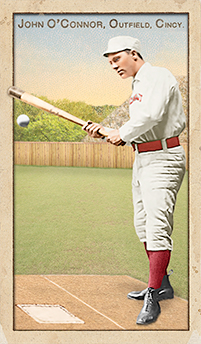
- Series: Beginnings: 1880's
- City: Cincinnati
- Team: Red Stockings (AA)
- League: American Association
John Joseph O’Connor (1866-1937) was as durable as they come. He holds the distinction, with a mere 28 others, of playing in four different decades in the majors. His durability was a product of his toughness. Despite the benign-sounding nickname of “Peach Pie,” O’Connor was known as one of the dirtiest players of his day and hard as nails. He excelled behind the plate, a position that devoured its occupants. With the Cleveland Spiders from 1892-98, O’Connor (also known as “Rowdy Jack”) hit .290+ four straight seasons. In his 21-year big league career, Jack hit a fine .263 He had started out with Cincinnati’s Red Stockings in 1887 and stayed in the Buckeye State with the Columbus Solons and Cleveland until he moved to St. Louis following the ‘98 campaign. He would move on to Pittsburgh and New York before landing back in St. Louis in 1904 where he remained through 1910.
Jack's waning days in St. Louis proved fateful for he and two of the game's all-time great hitters. Nap Lajoie and Ty Cobb were locked in a memorable duel for the batting title (and thus, the 1910 Chalmers Award) as the season wound down. O’Connor was the player/manager of the Browns when Lajoie’s Naps came to town for a season-ending double-header at Sportsman’s Park. History doesn’t record why O’Connor so strongly preferred Nap to win the title, but we might suppose Cobb wasn’t any more beloved in St. Louis than elsewhere. In any event, “Peach Pie” ordered his rookie third baseman Red Corriden to play back . . . way back, as in short left field. Lajoie proceeded to drop five bunts down the line, all for base hits. Lajoie reached base on his 6th at bat on a fielder's error, but O'Connor tried to bribe the official scorer to change the error to a hit, even offering to buy the woman a new wardrobe. The batting title and Chalmers Award went to Cobb despite the host’s accommodation. The difference in final average was minute, and the controversy inspired Chalmers to give both Lajoie and Cobb new cars. But the escapade cost O’Connor his job as league president Ban Johnson ordered him and Browns' owner Robert Hedges fired and banned. Decades later, research found Cobb had been double-credited with one day’s results. In 1981 Lajoie was declared the true winner of the batting title for 1910, by seven thousandths of a point. Rowdy Jack’s revenge….
- O'Connor's stunt got him blacklisted and unofficially banned from major league baseball for life
- At age 46, Jack returned to Cleveland’s Forest City club in 1912 for a last hurrah. No data survives for that team’s year but Baseball Reference records O’Connor managed the squad
